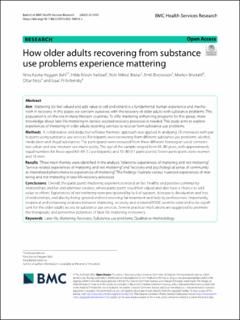| dc.description.abstract | Aim: Mattering is a fundamental human experience promoting crucial components to later-life recovery processes. Today, the largest population of older adult persons with substance use problems, so far, is on a steep rise in many Western countries. To tailor and offer substance use services promoting mattering, more knowledge about later life mattering of older adults recovering with the assistance of substance use services is needed. This study aims to explore conditions for, and experiences of, mattering in older adults in service-assisted recovery from substance use problems. Methods: A collaborative and deductive reflexive thematic approach was applied in analysing 23 interviews with participants using substance use services in their recovery processes from different substance use problems: alcohol, medication and illegal substances. The participants were recruited from three different Norwegian contexts: two urban and one medium size municipality. The age of the sample ranged from 65-80 years, with approximately equal numbers for those aged 60-69 (12 participants) and 70-80 (11 participants). Seven participants were women and 16 men. Results: Two main themes were identified in the data: “Conditions for later life mattering” and “Experiences of mattering from community relationships and own actions”. The findings illustrate various conditions for mattering and experiences of mattering and not mattering in later life recovery processes. Conclusions: Several participants experienced not mattering; promoted by lack of support, disrespect and devaluation and loss of relationships, but also being ignored and not receiving fair treatment and help by service professionals. Overall, the participants’ mattering depended on fair and healthy community relationships; fair distribution of resources such as affordable housing, accessible transportation, and fair organizational structures where participants could feel valued and also have a chance themselves to add value to others. Several practical implications to enhance the therapeutic and preventive potentials of later life mattering in recovery are suggested. | en_US |

